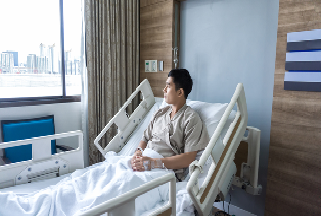Outpatient experiences with the mobile JKN queuing system
Patient satisfaction at a hospital in Makassar
DOI:
https://doi.org/10.24252/sociality.v4i2.60465Keywords:
digital health, outpatient satisfaction, queuing systems, rural hospital, service integrationAbstract
Recent advancements in healthcare technology have introduced innovations such as the Mobile JKN queuing system, designed to streamline outpatient registration and enhance patient convenience. However, there remains a gap in understanding patient experiences and satisfaction with these digital interventions in rural hospital settings. This study aimed to explore and describe outpatient experiences using the Mobile JKN queuing system and assess satisfaction levels at Stella Maris Hospital in Makassar. A qualitative phenomenological approach was employed, involving in-depth interviews, observation, and documentation with outpatients, BPJS officers, and outpatient department leaders. Findings revealed diverse patient experiences, with some respondents expressing appreciation for reduced on-site waiting times, while others were dissatisfied due to extended waiting despite app registration. Additional factors influencing satisfaction included lack of social interaction, inaccurate information, inconsistent scheduling, and limited doctor availability. Relational, functional, and service integration issues contributed to negative perceptions and identified existing gaps in the digital queuing system. These insights underscore the need for ongoing evaluation and targeted improvements in digital health service delivery in rural areas, with implications for optimizing patient-centered care and technology adoption.
References
Adhikari, M., Poudel, N., Mishra, S., Shrestha, A., & Upadhyaya, D. (2020). Patient satisfaction and its socio-demographic correlates in a tertiary public hospital in Nepal: A cross-sectional study. https://doi.org/10.21203/rs.3.rs-42106/v1
Afrashtehfar, K., Assery, M., & Bryant, S. (2020). Patient satisfaction in medicine and dentistry. International Journal of Dentistry, 2020, 1–10. https://doi.org/10.1155/2020/6621848
Afrilies, M., & Naili, Y. (2023). Legal aspects of telemedicine health services in the perspective of health law in Indonesia in the digital era. JAHIR, 1(1), 41–46. https://doi.org/10.59247/jahir.v1i1.23
Aisyah, D., Setiawan, A., Lokopessy, A., Faradiba, N., Setiaji, S., Manikam, L., & Kozlakidis, Z. (2024). The information and communication technology maturity assessment at primary health care services across 9 provinces in Indonesia: Evaluation study. JMIR Medical Informatics, 12, e55959. https://doi.org/10.2196/55959
Agustina Hakim Safira, et al. (2024). Pengalaman pasien rawat jalan dalam menggunakan sistem pendaftaran online di Rumah Sakit X Bandung. Jurnal Kesehatan, 8(4).
Arnita, H., & Yunengsih, Y. (2024). Pengaruh penerapan aplikasi pendaftaran online terhadap pelayanan pendaftaran rawat jalan di Rumah Sakit Hasna. Jurnal Kesehatan, 5(3), 2752–2760.
Fadila, A., Hidayati, I., Yunita, S., Titani, M., & Atmadani, R. (2022). Patient satisfaction of pharmaceutical services during the COVID-19 pandemic in the public healthcare center of Singosari, Malang. KNE Medicine. https://doi.org/10.18502/kme.v2i3.11846
Fennessy, S., McGarvey, C., McDermott, E., Burns, R., & Redmond, P. (2025). Impact of digital health interventions on patient satisfaction in outpatient gastrointestinal endoscopy: A systematic review. BMJ Open Gastroenterology, 12(1), e001744. https://doi.org/10.1136/bmjgast-2025-001744
Hidayat, R., Zafira, G., Nurfitriani, N., & Syahida, A. (2023). Digital healthcare development for global citizenship: Equality of access to health facilities and services during the COVID-19 pandemic in Indonesia. KNE Social Sciences. https://doi.org/10.18502/kss.v8i3.12813

Downloads
Published
How to Cite
Issue
Section
License
Copyright (c) 2025 Andi Khairul Musyawir, Cesilia Indriayu Maturbongs

This work is licensed under a Creative Commons Attribution-NonCommercial-ShareAlike 4.0 International License.

